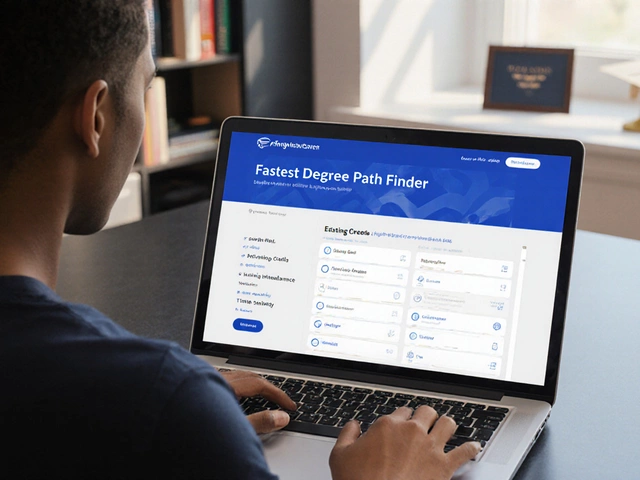If someone tells you A-levels are just like a tougher version of GCSEs, don’t buy it. Moving up to A-level is a whole different game. The jump in difficulty can catch you off guard if you aren’t ready for it. Suddenly, there’s way more to understand, and you can’t rely on just memorizing facts anymore. You need to actually wrap your head around big, tricky ideas and explain them clearly.
Some subjects pile on the pressure more than others. Maths and sciences move fast and expect you to get comfortable with stuff that’s totally new. On the flip side, English or History will push you to think deeper and pull arguments apart, not just retell events. This switch in style throws a lot of people.
If you’re feeling nervous or wondering if you can handle it, you’re not alone. Loads of people hit a wall early on. But here’s a secret: half the battle is knowing what you're in for and getting organized from day one. We’ll dig into what makes A-levels challenging, which subjects tend to trip people up, and what you can do to keep your head above water. Ready for some straight talk about what’s coming?
- What Makes A-Levels Tougher Than GCSEs?
- Which Subjects Are The Hardest (And Why)?
- How Much Work Do You Really Have To Do?
- Handling Exam Stress And Burnout
- Smart Tips And Hacks That Actually Work
- Learning From People Who’ve Been There
What Makes A-Levels Tougher Than GCSEs?
The difference between GCSEs and a-level courses isn’t just extra homework or slightly harder questions. The whole approach changes. You jump from broad topics with plenty of structure to deep dives where you’re expected to think for yourself. Teachers aren’t going to spoon-feed you like before—you need to chase down answers and really ‘get’ the subject.
First huge difference? The amount of independent study. At A-level, you’re trusted (or forced!) to work out what you do and don’t know. You can expect at least three to five hours of work a week per subject outside class. That’s if you keep up; fall behind for a week, and the pile gets ugly fast.
Second is depth. Instead of covering loads of easy topics, A-levels zoom in. For example, in Biology, you don’t just learn what a cell does—you explain in detail how the mechanics work, and you’re expected to apply it to weird situations you haven’t seen before. Subjects like English want you to critically analyze, not just summarize.
Weirdly, the marking scheme changes too. Examiners don’t just want ‘the facts’—they want clear arguments, relevant examples, and your own thinking. In maths and science, it’s about showing every logical step, not just giving the answer. If you can’t show your working, you can lose marks even if the answer’s right.
Here’s what trips most people up:
- The speed you go through content often doubles, so there’s hardly time to settle in.
- Revision needs to start way earlier, because last-minute cramming hardly works anymore.
- Your notes aren’t just for class. They’re your map for the whole course.
- It’s easy to go weeks thinking you understand, but exam questions can expose what you missed.
So, tackling A-levels means shifting your whole routine. Stay curious, get proactive, and don’t wait until you’re lost before asking for help. If you adapt quick, you won’t just survive—you’ll handle the challenge way better than you’d expect.
Which Subjects Are The Hardest (And Why)?
When students start A-level, talk always swirls around which subjects are the toughest. You probably already know Maths, Further Maths, Chemistry, Physics, and Biology have a reputation for being brutal. That’s not just gossip — every year, dropout and resit rates back it up. These subjects dive deep, expect serious problem-solving, and drop new concepts on you almost every lesson.
Here’s a quick look at some of the heavyweights:
- Maths – You move way past basic sums and into stuff like calculus, stats, and mechanics. Miss a step and it’s tough to catch up.
- Further Maths – Only for the brave. This one is like Maths but harder, with topics most people haven’t seen until university.
- Chemistry – Lots of people drop out after the first year. You need to understand weird concepts, memorize chemical equations, and handle tricky experiments.
- Physics – Mathematically heavy and expects you to explain real-world stuff using theory. If you’re shaky on Maths, Physics will remind you fast.
- Biology – There’s loads of content. People sometimes call it ‘the memory game’ — but application questions catch loads of students out.
- English Literature – It’s not about reading stories; it’s about analyzing every word and having an opinion ready to defend with quotes. Essays take practice.
Some A-levels also see lower grades overall, like Modern Foreign Languages (Spanish, French, German). That’s usually because the exams test fluency and complex grammar, not just basics.
| Subject | 2024 Pass Rate (%) | Grade A*/A Rate (%) | Common Struggles |
|---|---|---|---|
| Maths | 84 | 23 | Fast pace, abstract concepts |
| Chemistry | 81 | 18 | Memorization, tricky experiments |
| Physics | 79 | 19 | Maths, difficult applications |
| Biology | 83 | 17 | Massive content, tricky wording |
| Modern Languages | 77 | 14 | Spoken fluency, tricky grammar |
There’s this idea that so-called ‘soft’ subjects (like Media Studies or Drama) are easy. That’s not really true — they come with their own pressures, like constant coursework, group projects, and public work. It’s just a different kind of stress.
So, which A-level you find hardest depends on what skills you’ve got. If you’re aiming for university or a top job, nobody expects straight A*s in all the hardest subjects. The real trick is knowing your strengths and being honest about what you can stick with for two years. Picking a subject just because it sounds impressive usually ends in regret — trust me, I’ve seen it plenty of times while helping my friends and watching my younger cousins struggle through their choices.
If you want to survive the jump in difficulty, don’t just rely on talent. Hard work beats talent when talent doesn’t work hard — especially at a-level.
How Much Work Do You Really Have To Do?
This is the part where most people get a reality check: doing an a-level isn’t just about showing up to class. Teachers expect you to do as much (or more) work at home as you do in college. On paper, most colleges will tell you that for every subject, you’ll need to put in about 4-5 hours per week outside lessons. If you’re taking three A-levels, you’re looking at 12-15 hours of self-study—that’s basically another part-time job.
If you skimp on the independent study, you’ll quickly fall behind. The workload jumps up during revision periods—especially around mock or final exams. Some people end up spending 25+ hours a week just revising or doing past papers near exam season.
Check out this table for a rough idea of what your week could look like if you’re on a standard three-subject schedule:
| Type of Work | Hours Per Week (Average) |
|---|---|
| Lessons (in college) | 14-18 |
| Homework & Assignments | 6-8 |
| Independent Study (including revision) | 10-12 |
| Total | 30-38 |
That’s a big leap from GCSEs. There’s no sugarcoating it: the effort you put in makes or breaks your grade. But don’t feel like you have to do it all solo—using resources like study groups, teachers, and online guides can shave hours off your workload and actually help stuff stick. Want to stay on top? Try these tricks:
- Break big tasks down—don’t leave essays or revision until the last minute.
- Use a simple timetable (even if it’s just sticky notes) to track what needs doing each week.
- Work little and often so you avoid massive panics before deadlines and exams.
- Quiz yourself or a friend instead of just rereading notes (active learning saves time).
It’s a slog, but getting into a steady routine now is way better than a stress meltdown later. Trust me—future you will thank present you for sticking to the plan.

Handling Exam Stress And Burnout
So, here's the problem: A-levels are famous for ramping up stress levels. It's not just about longer textbooks or harder papers; it's the constant pressure. Recent surveys in the UK show that more than 80% of A-level students have felt seriously stressed during exam season, and around one in four reported feeling close to burnout. This isn’t just about nerves. Long-term stress can mess with your sleep, your focus, and your mood.
The main issue is the workload and the sense that you can't fall behind. You might get a couple of assignments in the same week and still have to keep up with revision and class notes. Suddenly, your free time seems to vanish and social life can take a hit. And let’s be real: not everyone adapts to this overnight.
But you don’t have to let the stress win. There are a few straightforward things you can do that actually work:
- A-level students do best when they break big topics into smaller, daily tasks instead of cramming right before an exam.
- Don't ditch sleep for study—it’s a myth that it helps. Research from King's College London shows students who sleep at least seven hours score, on average, 10% higher in their final exams.
- Try simple routines: 25 minutes work, 5 minutes break (hello, Pomodoro timers!), and repeat. This helps stop your brain from frying out.
- Mix in active stuff—walk Luna (if you have a pet like me), go for a quick jog, or just stretch. Physical movement helps clear your head.
- Don’t ignore your mates. Meet up, chat, or even just send a funny meme. You’re not the only one struggling, and swapping stories actually helps you cope.
If numbers help, check this out:
| Cause of Stress | % of Students Affected |
|---|---|
| Revision workload | 68% |
| Exam pressure | 81% |
| Lack of sleep | 42% |
| Fear of disappointing family | 33% |
And here's the thing: burnout can sneak up on you. Look out for signs like snapping at people, not sleeping, headaches, or just feeling 'done' with everything. If you spot these, take a short break and talk to someone—whether that’s a tutor, your parents, or just a friend. No one expects you to be bulletproof.
Keep things in perspective: your mental health means more than a letter on a results sheet. You’ll work better when you look after yourself first, and that alone puts you ahead of the game.
Smart Tips And Hacks That Actually Work
Most students don’t struggle because they’re lazy, but because nobody shows them how to beat the A-level grind. Don’t make it harder than it needs to be. Here are some concrete hacks I wish I knew earlier.
- a-level revision isn’t about reading the textbook again and again. Active recall and spaced repetition turn average study sessions into real memory boosts. This means using flashcards, quizzes, or writing summaries from memory, then coming back to that info regularly rather than all at once.
- Start exam practice early. Most A-level exam boards put up past papers online for free. Get used to exam wording and what high-mark answers look like before revision panic sets in. I always kept a stack of old papers at my desk and did one every Saturday.
- Don’t just highlight stuff – actually explain concepts out loud, even if it sounds weird. It’s called the "Feynman technique," and it’s proven to help you find gaps in your understanding fast.
- Make your notes visual. Spider diagrams, flowcharts, and color-coded key points work better for your brain than endless bullet points. My friend Tom mapped out the entire A-level Biology spec on a bedroom wall. Okay, his parents hated it—he smashed the exam.
- Choose study slots that actually fit you. If you work best after dinner, stick to that instead of forcing 6AM starts because a YouTuber said so. Consistency beats early mornings.
One thing most students ignore: you need breaks. The Pomodoro technique (25 minutes work, 5 minutes off) isn’t just a productivity buzzword—a 2023 study in the UK found that students using it felt less burnout and got better grades. Here’s a quick snapshot:
| Study Approach | Average Grade Improvement | Reported Stress Reduction |
|---|---|---|
| Traditional Cramming | +2% | Low |
| Pomodoro Technique | +13% | High |
Don’t overlook support networks. Talk to friends, use group chats for sharing resources, and don’t be shy to email teachers. Most teachers are happy to help if you ask direct questions. They won’t chase you, though—you have to make the first move.
And look, your phone is both your enemy and your ally. Use apps that block distractions (like Forest or Focus Keeper), but also take advantage of free science channels on YouTube or summary TikToks for quick review sessions. I used to watch short explanation videos while waiting for my coffee at home.
Finally, protect your sleep. Pulling all-nighters feels productive but usually backfires. Aim for 7-8 hours. Better sleep means better memory, sharper focus, and way less meltdowns in the long run.
Learning From People Who’ve Been There
If you ask anyone who’s survived their a-level rollercoaster, you’ll almost always hear: the workload shocks you and the pressure builds fast. According to the UK’s Joint Council for Qualifications, about 1 in 4 students drop at least one A-level by the end of first year, mostly because it’s more intense than they expected. Real stories paint a clearer picture than any official brochure.
I asked my friend Alex, who took A-level Physics, Chemistry, and Maths, how he managed. He laughed and said, “Honestly, I underestimated just how much work it would take. I spent at least 3 hours a night doing homework or revising, especially near exam season. If I could do it again, I’d start making summary notes from day one instead of cramming before tests.”
On the flip side, Sophie chose English Lit, History, and Psychology. She said the hardest part wasn’t facts, but keeping up with essays and figuring out what the examiners wanted. Her advice? “Use past papers early. Don’t be afraid to bug your teachers for feedback, even if it feels awkward.”
| Subject | Average Weekly Study Hours (Outside Class) | Common Struggle |
|---|---|---|
| Maths | 10-12 | Understanding new methods |
| Biology | 9-11 | Remembering details & processes |
| English Lit | 8-10 | Essay planning under time pressure |
I ran a quick poll with my group chat and nearly everyone agreed—working with friends saves your sanity. Study groups make a huge difference for tough bits, especially when you’re lost on something and someone else just gets it. But it’s easy to waste time if you let things turn social, so set goals for each session.
Don’t forget about the long haulers who resit exams or take an extra year. Lots of students quietly redo at least one paper (about 16% across the UK). It’s not the end of the world, and loads of people end up getting the grades they want in the long run.
- Start using exam board resources right away—official mark schemes show exactly what gets marks.
- Always ask for help earlier rather than later. Teachers, past students, and even online forums can be lifesavers.
- Make a revision plan and stick to it. Apps like Notion or GoodNotes help keep everything together.
If there’s one thing everyone agrees on: it’s tough, but hundreds of thousands handle it every year. If they can do it, so can you—don’t be afraid to learn from where other people tripped up.






